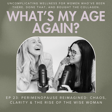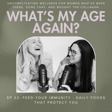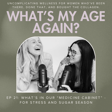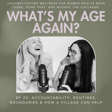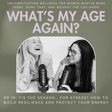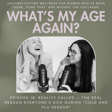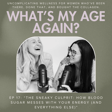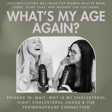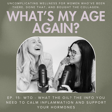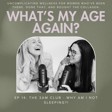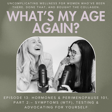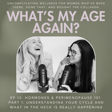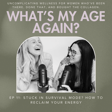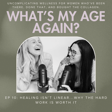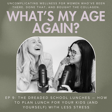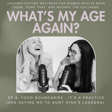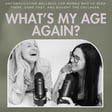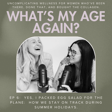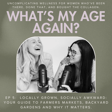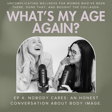Become a Creator today!Start creating today - Share your story with the world!
Start for free
00:00:00
00:00:01

Episode 3: Sunscreen, But Make It Not Chalky: Your guide to all things sunscreen, what to look for and what to avoid.
Is your sunscreen messing with your hormones? Kim and Tanya break down confusing ingredient labels and “natural” claims so you can protect your skin and hormones this summer.
They cover:
- The 5 most toxic sunscreen ingredients/how they are messing with your hormones
- The truth about vitamin D and sun exposure
- Clean mineral sunscreen picks that actually work
Top 5 Ingredients to Avoid: 👉 Learn more (EWG)
- Oxybenzone: endocrine disruptor, linked to breast cancer/endometriosis
- Octinoxate: hormone disruptor, 16x above FDA safety threshold
- Octisalate: possible xenoestrogen, 10x over systemic exposure limit
- Avobenzone: blocks testosterone, 9x FDA safety limit
- Octocrylene: contaminated with benzophenone, builds up over summer
Our Favourite Clean Sunscreens
- Beauty Codes: https://beautycodes.ca/products/time-to-shine-spf
- Attitude: Tinted Mineral Sunscreen Face Stick
- Green Bever Mineral Sunscreen: https://greenbeaver.com/collections/spf
- All Good: Mineral Sunscreen Butter Stick / Mineral Sunscreen Butter
- Juice Beauty: Sunscreen
Where to find us: IG @whatsmyageagain.podcast / Email us at: wmaapod@gmail.com
Where to find Tanya: IG + FB / https://www.tlcholistic.ca/Booking: https://tlcholistic.janeapp.com/locations/tlc-holistic / Join the TLC Community: https://www.patreon.com/tlcholistic
Where to find Kim: IG @kimdesmarais.nutrition / FB @KimDesmarais / https://www.kimdesmarais.com/Booking: Complimentary Connect Call
Transcript
Introduction to 'What's My Age Again' Podcast
00:00:00
Speaker
Welcome to What's My Age Again, the realest podcast for women who are done chasing trends and ready to feel empowered. Hi, I'm Kim. And I'm Tanya, holistic nutritionists and childhood best friends who've been there, done that, and bought the collagen.
00:00:16
Speaker
more than once. Each week we provide actionable steps that you can start today to help you thrive through every decade to come. We're cutting through the wellness noise to bring you honest conversations about aging, hormones, health, beauty, mindset, and everything in between.
00:00:33
Speaker
You see, we're also on a mission to age gracefully one WTF moment at a time. Backed by research and real life, we're here to share what actually works, what's a waste of time, and how to truly thrive through the messy, magical midlife transition.
00:00:49
Speaker
We're so happy you're here. Let's dive in.
Sleep Improvement Tips Inspired by Mel Robbins
00:00:53
Speaker
Hey, everybody. Welcome back to What's My Age again. Kim, what's up? How are you?
00:01:00
Speaker
I'm good. How are you? Welcome back, everybody. I am good. Thank you. um i just wanted to talk about this because it has been on my brain since we chatted last week.
00:01:12
Speaker
um When we were talking last week about um routines in the episode and you talked about nighttime routine, something I needed to get better at. I wanted to tell you that when you said putting your phone to bed and I can't remember who said that. Mel Robbins.
00:01:30
Speaker
Yeah. Thank you. thank you I wanted to report to you and to anybody listening, because this is a success for me and we're here to celebrate successes. I have been successfully putting my phone to bed at 8pm.
00:01:45
Speaker
What? Excellent. Yeah. and it felt How's your sleep been? I literally think like, I feel like it's helped. Like my sleep has always been pretty good. I should say good, good for where I'm at, but I feel like I'm falling asleep like in a second now and I've just had really good sleep. So whether you know what I mean, it's just that thought pattern energetically or that I'm actually having less time glancing at that blue light.
00:02:11
Speaker
I don't care. It's amazing. So I just wanted to share that. It has been awesome. awesome i'm afraid yeah so Yeah, that's delightful for me. um What about you?
00:02:23
Speaker
What's been new?
Managing Summer Schedules and Sunscreen Queries
00:02:25
Speaker
what's mini Well, I also need to work on well, my kids have been staying up later and later these days because we've um been on the baseball field.
00:02:34
Speaker
i feel like May and June and July are nonstop kids activities. And for anybody who has kids in summer baseball, it's full on.
00:02:47
Speaker
so we good that the baseball diamond if I'm not here in my office, it's at a baseball diamond. At a baseball diamond, which actually kind of goes with what we want to talk about today, maybe, if I can make that segue stretch. um Wanting to talk about sunscreen because we are really in summer and entering more of those summer months. And we've got a lot of questions, eh?
00:03:09
Speaker
i get questions all the time. especially What sunscreen do you use? ah Especially the big one, which is... what scheme send What natural sunscreen or healthier sunscreen can I use and not look chalky white?
00:03:27
Speaker
Oh my God. A thousand percent. Even me, I want to know too. I'll share with you, but I also want to know what sunscreens you're using. So like, um I'm excited to know what you're using as well. And same with me.
00:03:39
Speaker
I get a lot of questions about that. ah Also in terms of even, is it better not to wear sunscreen again? There's so much noise out there. So I think we should just get to it.
Are Conventional Sunscreens Harmful?
00:03:52
Speaker
Let's cut through the noise and make this a super powerful informational episode that you guys can take with you out of here into the stores and onto your skin.
00:04:06
Speaker
Yes. A thousand percent. And I think we need to first address that. conventional sunscreens, like what are we worried about here? If it's going on our skin, like why should we be worried? I think that's a question I get a lot too. I don't know about yourself.
00:04:22
Speaker
For sure. Well, and I think, you know, to your point, Tanya, it's like, we know that what we put in our body is important. We talk a lot about food and a lot about toxins in our food, but what goes on top of my body or your body is also important or breathed in through your lungs.
00:04:40
Speaker
And the reason is because all of those chemicals are absorbed into our system Absolutely. So the thing with that too, is that we're always referring to our skin being our largest organ because it is an organ. And like, you know, if you've worked with me before, you might get frustrated, but if you're coming to me for things like acne, eczema, anything skin related, I'm not treating your skin topically.
00:05:08
Speaker
I'm going inside. So it's what we put on goes in. And as you said, these ingredients, they're getting absorbed. into our blood bloodstream, sorry.
00:05:20
Speaker
And I was reading something a little while back that sunscreen ingredients can be detected in our bloodstreams for at least a few days and even longer, just after a single application.
00:05:35
Speaker
So think about that for a second, single application. I'm sure when you're on the diamond, like we're doing more than that. I sure know if I'm spending a day hiking or at the beach, like I'm not just putting on sunscreen once, like yikes.
00:05:47
Speaker
Think about how many times for all the moms out there, think about a beach day with your kids and how many times you lather them up or spray them down. Okay. It's true, Tanya. It's really scary.
00:05:59
Speaker
A thousand percent. And then also something I was researching as well um is one single application. There can be up to 180 times the amount of these potentially harmful ingredients, which we're going to get into in two seconds, in the blood. 180 times the amount of that. that So let me go back and say the levels that are tested um by the list grass. I don't know if you guys have heard of it. It's generally recognized as safe.
00:06:33
Speaker
I'm just going to leave it here without going too far. I'm not saying that that's the Holy grail because there's a lot of problems with these lists, but if we're using it as a benchmark, 180 times more than what they even consider safe.
Harmful Ingredients in Sunscreens
00:06:46
Speaker
but yeah No, right. And sort an Tanya, actually i was reading a study actually when I was preparing for this episode, yeah i was reading a study that suggests that these chemicals that we're listing, as you mentioned, they show up in breast milk, they've shown up in urine.
00:07:01
Speaker
And so it's a systemic issue. It goes through our bloodstream, goes through our whole body. um So yeah, they're highly absorbable and they stay in our system, as you said, for a while.
00:07:12
Speaker
I love that you said that. That's such a good point to remember, everybody. Systemic. Like it is throughout our bodies. So like, yikes, I didn't even realize that about the breast milk. That is definitely um alarming.
00:07:26
Speaker
So what are these ingredients? Everybody's like, okay, girls, get to to the point. You've probably gone to your like pantries, your cupboards. and grabbed your sunscreen and you're waiting for us to tell you the ingredients. So I'm going to be full disclosure, Kim, because you know, that's who I am.
00:07:41
Speaker
Me and Kim practice reading these ingredients to each other. I'm still probably going to butcher the names. So you will see them in the show notes in case you're like, What did they just say? What did they just say? You can't kick it off. You butcher the first one. Go for it.
00:07:57
Speaker
The first, first ingredients you never want to see in your sunscreen is oxybenzone. And this is actually one of the debatably most worrisome of ingredients. It is an endocrine disruptor, which means it disrupts our hormones and ladies, that's what we're, we're going to be talking a lot about hormones on this podcast.
00:08:15
Speaker
We are i want to stay away from endocrine disruptors. Um, it has, it has been shown to have higher adverse effects in children just because they're more susceptible. Um, it can increase the risks of breast cancer, endometriosis, um, and yeah, carcinogenic effects.
00:08:35
Speaker
Okay. Well, that's ingredient number one. And if that isn't enough for you, um, we're going to go to number two, which is oxynoxate octanoxate.
00:08:47
Speaker
I'm not even going to do the name in the brackets. So there's another name for that. So check it out below. um So this is also one that definitely is found in the bloodstream.
00:08:59
Speaker
um High amount, over 15 times the amount um as proposed saved by the FDA. Again, I'm personally just going to put that out there with loose grain of salt. But again, if the FDA is telling you that it's in excess, that is something to really think about and one single application.
00:09:20
Speaker
So same thing. um It is definitely an endocrine disruptor. We don't need any of those more in our lives. And this one can actually negatively affect our metabolic system.
00:09:31
Speaker
And we never want to mess around with that. That is the whole entire system. That is the basis
Safer Alternatives: Mineral-Based Sunscreens
00:09:36
Speaker
of, you know, our body. Our cellular energy. Absolutely. Exactly.
00:09:42
Speaker
Okay. Number three, um, Octosalate. That's a good pronunciation. That's right. And so this, again, highly absorbable ingredient, 10 times more than the FDA's cut off for systemic exposure.
00:09:58
Speaker
um It's linked to skin irritation, allergies, possibly an endocrine disruptor. with and it has this ability to bind to our estrogen receptors, which means it limits estrogen in our body.
00:10:13
Speaker
which we call xenoestrogens, which again can be for another podcast, but essentially um it's mimicking estrogen in our body. that's xenoestrogens. So, you know, another big one.
00:10:26
Speaker
All right. Number four, Tanya. So three out of three is hormone disruptors. Number four, will it be a hormone disruptor? So avobenzone here, we single application. We see it in the blood at over nine times the level, um what we consider to be safe.
00:10:43
Speaker
I don't know if it's ever considered safe at any level, but who am I? um Oh, yeah, shocker, endocrine disruptor. And um hey, I know that we have probably primarily women who are listening to this, but this is important too. You know, if we have men in our life, if we are raising sons, like I know you are, Kim, as well, this one can block the effects of testosterone at the cellular level.
00:11:08
Speaker
And I should also go back to say that this affects us as well. Obviously we do have testosterone in our body as well. So we don't want these rights to. well but our Yeah. so mazir is you're up for Absolutely. heston yeah Okay. Number five.
00:11:26
Speaker
you if of course it's the hardest one to pronounce. Here we go. Octocirulene. So this chemical again, readily absorbable. That's all of these five are readily absorbable into the skin.
00:11:39
Speaker
um It's often contaminated with the known carcinogen benzophenone. According to recent studies, its levels can increase when it's stored in the body, which will happen with repeated exposure. So think about how often we put on that sunscreen on a typical day at the beach or all summer long.
00:12:02
Speaker
so Yeah. And like, that's wild. So again, we just want to outline the top five because if you're using a conventional so sunscreen, I'm going to be honest, chances are it will have most of these or even one to two.
00:12:18
Speaker
So that we're not even touching upon, you know what I mean? Like the parabens, the emulsifiers, the fragrances, that's, that's a whole other thing. We're really just talking about these damaging five here, but That's just the tip of the iceberg at the end of the day, right?
00:12:33
Speaker
Absolutely. And you know what, for all, for, you know, the other piece of this is these ingredients are also known to be harmful for the environment, specifically coral reefs and aquatic life.
00:12:45
Speaker
And, you know, when, when looking at these studies, when we were preparing for this podcast, there's not a lot of, we don't really know the long-term effects.
00:12:56
Speaker
So it's, it's important to be aware. I love that. Thanks for bringing that up as well. And you know what? We're starting to see things. i am anyways. um The last trip I was on back in March, we were in Barbados and like, it's so sad when you see, you have to see signs posted about wearing reef friendly sunscreens.
00:13:21
Speaker
Obviously these are being posted for a reason. Obviously they're seeing damage to, you know, the fragile coral reef systems and the ocean itself. And Yeah, that's just sad and scary. And, you know, it's detrimental for us. It's detrimental for the environment as well. Absolutely. And amazing. I didn't know they had signs like that, Tanya. I've never actually seen them.
00:13:42
Speaker
Yeah, it was. I feel like I saw them also maybe one time in Mexico in a certain spot. But yeah, they were all over Barbados. And like, definitely. um The good news is, is that my sunscreens were reef safe.
00:13:56
Speaker
Because I have chosen to transition, obviously, years ago. into healthier alternatives, um which we're gonna talk about, right? We're not just gonna give you guys all doom and gloom, no Kim, and then be like, okay, bye. Like we're gonna talk about some healthier alternatives maybe.
00:14:11
Speaker
Absolutely, absolutely. So when we shift into healthier alternatives, instead of using these potent chemicals to block the sun,
00:14:22
Speaker
I think the top two things that we really see are mineral-based sunscreen, either typically being zinc and or, because there's blends, um titanium oxide is what I've been, you know, using myself. I'm sure you are the same, Kim.
00:14:40
Speaker
Yeah, that's exactly it. So basically... um These two minerals literally work to block both UVA and UVB rays, just like conventional sunscreen does, right?
00:14:57
Speaker
The difference is um they both offer broad spectrum protection and they don't offer all of the detriments that we stated previously. about these chemical compounds to our body. So they also are natural compounds, which is amazing.
00:15:11
Speaker
And actually I found out while researching for this podcast as well. Did you know, Kim, they have like zinc and titanium are anti actually anti-inflammatory. So it's good for like sensitive and reactive skin, which is what I used to have.
00:15:26
Speaker
That's amazing. And I guess that makes sense. Zinc. it right actually happens less absolutely oh yeah that's right right and It's true. So purchasing a product with zinc rather than the chemicals, as well as looking for fragrance free, especially if you are sensitive.
00:15:49
Speaker
Yeah, that's so true. And oh my gosh, I was, I'm sure you remember Kim. I feel like you had sensitive skin too, though, but in different ways, like growing up. my skin would react to everything. And yes, we know that wasn't just a topical issue. What we know now, however, though, putting my mom slathering me, like slathering me from head to toe and like copper tone and all of these things. Like I was just a walking rash and it was actually terrible. And then heat would make it worse. The sun is hot. Like it was just a nightmare. And I've never had that experience. I've obviously changed a lot of things internally to heal that
00:16:25
Speaker
but other episode, but with the sunscreens that I'm personally using, like I've never had a skin irritation ever, ever, ever. Amazing. And yeah, I remember I used to use Hawaiian Tropic because I loved the smell. that's Okay. Also side note for everybody listening, both Tanya and I have a Jasper system, which is an air filtration system. Again, another podcast, but we both love it. It filters the air in our home.
00:16:53
Speaker
I swear, like We've tested it out, both Tanya and i spraying sunscreen in the room. the Jasper literally goes on to suck out all the chemicals. like it it's talk It's wild. It's literally mean wild how fast it goes on. So um exactly. So now using these mineral based, essentially one thing that I think we should bring up Kim, that we were talking about as well, is that when you do look up the ingredient titanium dioxide, it can be classified as a possible human carcinogen, but here's what we have to say.
00:17:33
Speaker
um Only because the potential for exposure through inhalation. So for this reason, things that are powders, a lot of makeup, actually. yes I'm wearing bronzer right now that has titanium, but not powdered.
00:17:46
Speaker
um So a lot of bronzers in powder or spray formulations, that's what would be a concern. And it's an irritant. Exactly. yeah Exactly. But when it's a cream and you know what I mean, we're not inhaling it. So I just think that's important for everybody to know as well that like, yeah, really good with these
Favorite Daily SPF Products
00:18:06
Speaker
sunscreens.
00:18:06
Speaker
Um, so can I ask you then Kim, what you are currently using right now? Sure. As a sunscreen or as some of your faves? Because I want to know. and i'll see I'll tell you mine after too.
00:18:20
Speaker
Okay. I think one of the things we talked about this at the beginning, one of the things that I absolutely hate yeah like is looking like chalky white. <unk>ve been there I bought this one It's called Derma E. It says on the front, ultra sheer mineral sunscreen mist.
00:18:42
Speaker
Okay. Looking. that it was going to be ultra sheer and no, my friend, it was not, I was literally, you could have seen me across the beach.
00:18:52
Speaker
Okay. So that's a hard no then. hard But what I do look, so two things. Um, number one, i have children, so I think I'll, I'll recommend some ones for the moms out there. Um, but we'll start with my face.
00:19:08
Speaker
So I use a daily s SPF. That's a tinted moisturizer. um I don't necessarily put it on all the time and Tanya, we can get into, you know, sometimes it's nice to have, to not wear sunscreen and we can get into that after, but I use this all the time and ah it's taken me a while to find one that I really like, but this one is by beauty codes, um, a Canadian company.
00:19:37
Speaker
It's called beauty codes, time to shine three in one daily FP SPF. It's s SPF of 44 and it has a tint to it. So when you put it on your face, it doesn't go white. it kind of gives you a bit of a glow and a tint, which I love. a And, you know, I obviously, when I purchased the sunscreen or this tinted moisturizer, I looked at every single active and beat ingredient on the back and every single one of them on the EWG website, which is a wonderful resource, by the way, for all you.
00:20:12
Speaker
We'll put it in our show notes, but if you have any questions about products that you're using, EWG, the Environmental Working Group, is an excellent resource to see what's in your beauty products.
00:20:25
Speaker
It's called Skin Deep. Anyways, all of the ingredients in here were rated really high on that website. So I love this product, Beauty Coating. And we'll link that in the bottom as well because I want to look into that.
00:20:39
Speaker
So can i share with you? right now I'm using for my face and like you, it's not all the time. And sometimes it should be more than I do. And I need to get better at that.
00:20:49
Speaker
Um, you know, my history, I am such a sun goddess to the point where I should have scaled it back maybe a little bit now that I'm looking at the crevasses and different spots.
00:21:01
Speaker
It is what it is, but I do use this more often than not. And, um, I'm really surprised with it. So same thing, obviously studied the ingredients before purchase and it's the attitude suddenly.
00:21:14
Speaker
And also like yours, Kim, it is tinted. It's a tinted mineral, um, sunscreen face stick. So like you open it up almost like deodorant and it's like a bar and you kind of just spread it on your face and rub it in and it's thick and it's nourishing. And I also don't look like you know what I mean? A pasty white, like, chalky mess yeah, exactly. Hot chalky mess. So yeah. And this one also here, actually, now that I'm looking at it has the ocean lovers right on the front ocean lovers, plastic free, um, vegan. So yeah, I'm really liking this one and you can get at like Walmart and shoppers, which I was really pleasantly surprised with. And again, we'll link everything below.
00:21:55
Speaker
So that's kind of my face go to, um, yeah, carry on, carry on down your sunscreen express. Another one that I've been loving too, that I find, yes, it's topical. It stays on, that's what zinc does. It stays on top of the skin, right? Act as that barrier, but it's not like, I don't find you have that white sheen layer to you and this green beaver.
00:22:20
Speaker
And so, you know, for my kids, I also use it. There's a cream that I use and I see you've got one too. is that your choice as I actually have the kid's sport and I do not have a kid. but Oh, we're matching. This isn't, we obviously you're not watching us, but we're both holding up the exact same sunscreen. Okay. So it's a mineral sunscreen by green beaver. Mine is 40 SPF sport, which is water resistant. So when we're at the beach, it's a great one.
00:22:49
Speaker
My youngest son absolutely can't sense. Well, he's getting better now. He's seven. But when they were really young, you know, ladies, moms out there, how hard it is to get your kids to stand still to put on sunscreen. And you like you have to resist the urge to spray them down. Like I understand seeing the moms that are like quickly spraying their kid as they're running for the water.
00:23:12
Speaker
i remember doing that as a kid, not as the mom, but I remember detesting my mom's like, I could see her on the beach like motioning like, come hither. And I was like, mom, No way.
Recommendations for Kids' Sunscreens
00:23:24
Speaker
So there is a green bay beaver, it's a spray, but it's not aerosol spray. is, you spray it, but it's a cream. And it goes on really thin, but again, it still has an s SPF of 27. So you can quickly spray, spray, spray, blend it in and go.
00:23:45
Speaker
so I find that like a ah nice happy medium between the aerosol sprays that we're we're telling you not to use and thick creams. because it's spraying out like a cream.
00:23:56
Speaker
Like, i you know, i just spraying out the cream, not as it's not aerosol. It's a pump spray. I love that. Yeah, that's super cool. And um I'm not surprised that we're both drawn to it. So back in the day, when I started using Green Beaver, maybe like, honestly, like eight or nine years ago, I'm not gonna lie, it was terrible.
00:24:15
Speaker
We couldn't rub it in. If, if I could show you could I mean, I'm sure my husband does not want in the show notes, but I wish I could. have a picture of us from when we were away. And he literally looked at me. He's like, babe, is it rubbed in on my face? And I like was like, oh my God, this man is covered head to toe and like hairy legs. Like he was just this chalk mess.
00:24:38
Speaker
And ah like, it was just a nightmare. So, but when you look at the front now of the green beaver, it actually says water resistant. I have the same one as you, Kim. Kids for it. And it says non whitening. Oh, and reef friendly.
00:24:51
Speaker
but yard like And I really have to say, they've got come a long way. I don't think it's whitening at all. Yes. Do you have to rub it in more than Hawaiian Tropic? Hawaiian Tropic for 10 years. So I don't remember the luxury of just having something glisten into my skin. But honestly, I think this rubs in really good. This is my like body sunscreen choice and the price point, Kim.
00:25:17
Speaker
Honestly, it's pretty good. wasn the one yeah and for comfortable like this Like we said, they have a lot of options. I think they have a stick, but we will, I'll have to research that one. We can put in the show notes where we find it. But I do also love for kids, the stick, kind of like what you were saying, Tanya, with your attitude Okay.
00:25:38
Speaker
okay na Because it's super easy to just like, so I also have one, it's called All Good. SPF 30. This one is for those kids who again, like are trying to race away from you as you're like frantically trying to put sunscreen on their face. is a little bit white, not as bad as some other sticks that I've used.
00:26:02
Speaker
Um, but it's also a good one that, and also one that you can stick on your purse. And if you're at the baseball diamond like me and your son's been in in the sun all day, you can quickly reapply. um and, and yeah, I find that one easy.
00:26:16
Speaker
Okay, so that makes me excited because I have an all good. I didn't know they had a stick. So I have an all good sunscreen butter. And it's actually in like this metal tin.
00:26:28
Speaker
um Again, we'll link everything. And this one is an s SPF 50. So you literally open it almost like a lip gloss tin. You know what I mean? And it's like a thick bomb.
00:26:39
Speaker
So it's a smaller tin. And because it's a 50, guess what? I use it for Um, tattoos, especially fresh ones. Gotta keep those, gotta keep keep my toxic ink fresh. I, I'm not, I know I'm.
00:26:53
Speaker
It's a balance thing. Yeah, we get it. It's a balance thing. That's my thing. Um, and also just delicate areas. You know, I have some sun damage on the bridge of my nose, those taller spots that always get the sun first, you know,
00:27:06
Speaker
yeah um I use it. it a Exactly. That's exactly what I do. Hands. Like, so that's my spot thing. So it is also the brand all good. Love it. love this for just targeted areas.
00:27:18
Speaker
Awesome. Yeah. I think we, I also have one by think baby and think sport. I find it a great sunscreen. it stays on. It's re friendly. It's long lasting, but it is on the chalk here side.
00:27:35
Speaker
Um, so I've never, I never use it on myself occasionally on my kids, but I, I've tended to stick strictly the green beaver now. You like to make the kids chalky, not me. Don't need to reapply. yeah Okay. That's, that's perfect. And the last one I'm going to mention is juice beauty.
00:27:56
Speaker
um love Love, love, the brand. They have a whole bunch of different things. This one is an s SPF 30 sport. um Again, everything we need, the water resistant, not chalky, just expensive AF.
00:28:14
Speaker
I'm not going to lie. I love everything about it. It's an investment. I come from the luxury world. It's a bit of an investment, but beautiful. I love it.
00:28:27
Speaker
beautiful true I love it, Kim. Like, I feel like we should just be showcasing. It's not a tint. but it goess on It goes on Smith.
00:28:38
Speaker
Yeah. It's just literally a broad spectrum sunscreen. So I'm not going to lie. I like this one a lot too, but for the big bulk of me, like my legs everything I'm putting on, you know, the green beaver, but sometimes I'll just put this on my chest or also,
00:28:54
Speaker
it's great because when we go away, I'll pack a lot of green beaver and I'll like, here you go to my husband. And I keep this luxurious one. love So if you want a bit of luxury juice beauty, it's amazing.
00:29:06
Speaker
Amazing. And for all of you listening to out there, if you haven't found us on social media, please reach out to Tanya and i um, on what's age band podcast.
00:29:18
Speaker
And let us know if you have some fabulous, um, sunscreen that you love because let's face it, we're a community here and we love to learn off each other. And Tanya and I love it when our clients find and show us great products.
00:29:35
Speaker
And also if you're looking and you're thinking, I'm a little worried, reach out to us as well and ask your questions. Yeah. Yeah. Good point. I love, there's so many products out there and it's just, you know what I mean? To get those recommendations is amazing.
00:29:51
Speaker
So can we, when I find a product, I usually like stick to it. So it's nice to know and hear about new ones that we can try. Absolutely. And can we circle back for a second?
00:30:05
Speaker
Sorry, let me clear my throat. Can we circle back for a second talking about no sunscreen, asking about why we don't put our, um, our face sunscreen on every day and kind of clearing up a little bit of misconceptions though, because it's not black and white. And I think a lot of the times when we see social media or influences or just read stuff, some people like never wear sunscreen and some people like always wear sunscreen. And I think there there's, this needs to be talked about. It's confusing. Well, and maybe first I'll say, remember everyone,
00:30:41
Speaker
the benefits of sunscreen, anti-aging, anti-cancer. We know that overexposure in sunlight can cause cancer and premature aging. So, you know, first and foremost, those are the benefits. That's the why that's why we wear it and why we put it on our kids.
00:31:01
Speaker
Absolutely. For sure. And then here's some of the other things about the balance part. So we know the pros and we know we need to have sunscreen in our life. but here's where the balance piece comes in.
00:31:13
Speaker
Our skin, our wondrous, like largest organ is designed to be exposed to the sun. Most humans skin cells everywhere, like the back of your knees, you know, we're talking about have vitamin D receptors.
00:31:31
Speaker
And this is going to be a whole other episode, but we are very in North America. Anyways, I can't say the statistics on the world, but, um, In North America, we are a vitamin D deficient society, right?
00:31:47
Speaker
And the best way, yes, everybody's like, well, I take D drops or I take this. Yes, we definitely need sometimes to supplement, but a supplement by definition supplements something else, supplements a good diet, supplements sunlight, right?
00:32:05
Speaker
So the fastest way to get that vitamin D is through skin exposure. And how Tanya, how does, do, how do we get vitamin d from the sun?
00:32:18
Speaker
I love this too. i care about Thank you for letting me take this one home. Cause love talking about you. So the sun reacts with actually cholesterol literally on our skin and it creates chain reactions in the body And this full spectrum sunlight, so we're talking about the UVA and the UVB rays, um activates our pineal
Understanding Vitamin D and Sunlight Exposure
00:32:43
Speaker
gland. It stimulates hormone production, regulates our circadian rhythm, um few was fuels so many different things in the body. It's insane. So Kim, I know you are someone too. I've seen it on your stories before, and we've talked about this, talking about the benefits of getting literally sunlight on your eyelids, right?
00:33:03
Speaker
yeah in the morning and how it relates to this chain reaction and how Oh, absolutely. And I think that is an when we talk about sleep hygiene as well and getting and our circadian rhythm and all of that, we're going to dive deep into this as well.
00:33:17
Speaker
But yes, sunlight in your eyes in the morning and actually where the sun falls in the sky, what Tanya was saying about the full spectrum the the the colors in the sunrise and in the sunset, the spectrum of light we receive affects our circadian rhythm.
00:33:37
Speaker
So for all of you seeing a sunset, it helps us to create then the melatonin that we need to go into our sleep cycle. call And then in the morning, seen you know seeing the light into our eyes.
00:33:50
Speaker
you know gets the the natural light into our eyes and sets our adrenals and our circadian rhythm up for success for the day. So, um so yeah, that's the other side of it And we can dive deeper for all of you interested in another podcast, but when it comes to vitamin d we need our skin that needs to be exposed to that light so that the cholesterol can do its thing and we can get the vitamin D.
00:34:18
Speaker
Absolutely. Other episode, even though we're speaking out loud and we're within an episode, cholesterol, that might be like 17 episodes. oh yeah Cholesterol is not the enemy.
00:34:31
Speaker
That is one putting it, putting it on the back
Balancing Sun Protection with Health Benefits
00:34:34
Speaker
burner here. So I think what we're trying to say, he's smart. Yes. That's exactly what we're trying to say. do not burn.
00:34:42
Speaker
yourself or please do not burn your children. um But have that balance, get some of that full spectrum light, not during peak hours. When do I wear sunscreen?
00:34:53
Speaker
When I'm going to be outside all day in peak hours. When do I not? Walking my dog in the morning or, you know, if I'm even going out for an hour and it's not scalding, you know, sunlight. Sure. I might protect my burny areas, might put a little bit of nutstick on my face, but I might not put it all over my arms if I'm going out for, you know, a little hike. Like be smart. I love that. That's really, you said it all. Be smart.
00:35:17
Speaker
Don't burn. You said it perfectly too, Tanya. You want to think about how long you're out in the sun. How long will your sun exposure be? And peak hours. We don't want to be going out in noon when the sun is fully in the sky um without sunscreen for full, you know, for hours.
00:35:33
Speaker
So yeah, I think that wraps up our episode. Yeah, absolutely. That was absolutely delightful. Thank you for sharing your sunscreen stuff too. I'm really interested about that first face one. So I'll definitely check it out.
00:35:48
Speaker
um
Conclusion and Summer Safety Tips
00:35:49
Speaker
Yeah. Thanks for chatting with us. Thanks for being here and go enjoy some summer weather, or maybe you're already listening to us at the cottage or by a pool somewhere, but yeah, enjoy it while we have it and be some summer.
00:36:05
Speaker
Yeah. yeah at the summer All right. Okay. See you next week. Bye. Bye. Hey guys, thanks so much for hanging out with us today.
00:36:16
Speaker
If this episode resonated with you, we would love it if you would hit like, subscribe to the podcast and share it with a friend. We love to hear from you because let's be honest, this show is for you.
00:36:27
Speaker
If you have a topic you'd love us to tackle or want to learn more about something we talked about today, send us a message. We got you. Stay connected with us on social media at what'smyageagain.podcast for even more knowledge and inspiration between episodes.
00:36:44
Speaker
Kim and I aren't doctors or your healthcare practitioners. Everyone's body is unique, so always consult your own healthcare care provider before starting something new.
